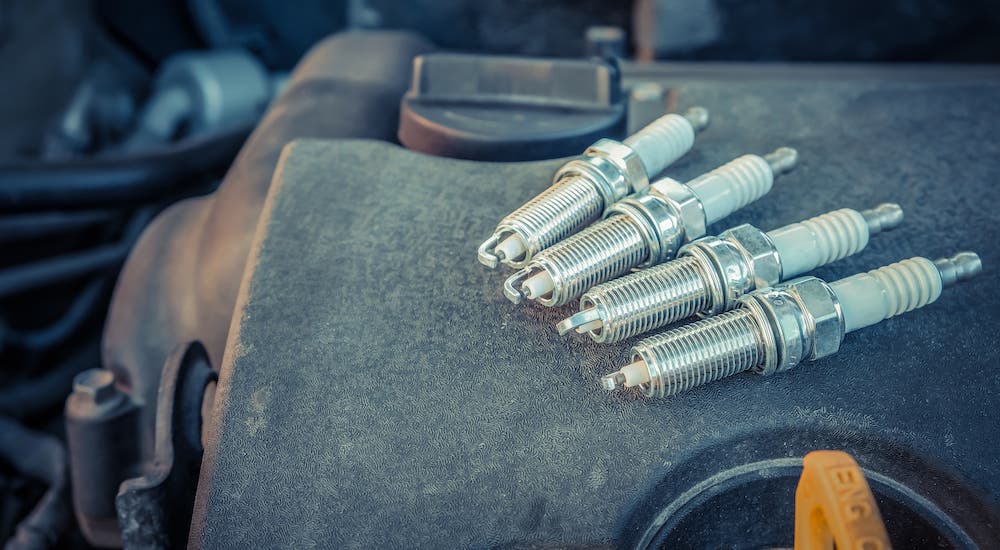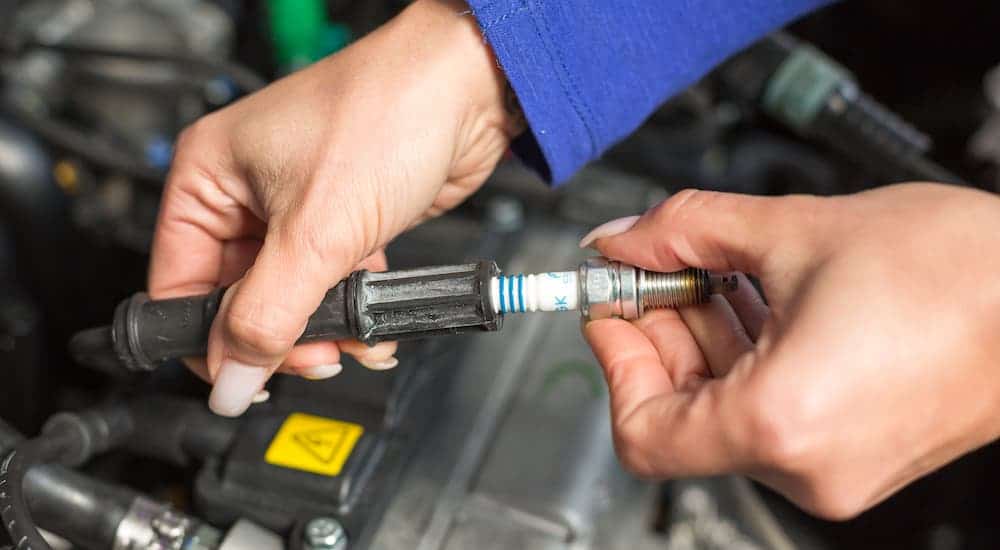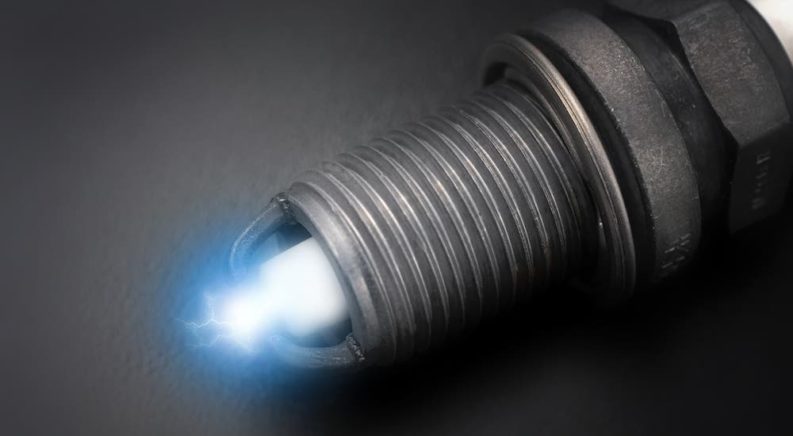Just about everyone who drives a car has heard of spark plugs, but plenty of drivers have no idea what they actually are. Simply watching TV shows and movies is enough to introduce the term to most people – it’s a great thing to randomly blame engine trouble on when a screenplay writer needs to make a car break down or not start. And we all know that spark plugs need to be replaced sometimes, but that doesn’t necessarily tell us why, when, or how to replace them.
Today, I’m going to take you through the basics of spark plugs and what they do in your vehicle’s engine. I’ll talk about what they are, how they work, why they’re important, and how they can wear down and need replacing over time. We’ll also look at how to tell when it’s time to replace them and some things you should consider when picking the right spark plugs for your vehicle when a replacement is needed. I’ll briefly discuss replacing a spark plug, but it requires a good amount of explanation and is better suited to a deeper exploration in the future.
Where Are Spark Plugs Located?
Before I get into what spark plugs actually do, it’s important to understand where they’re located within your vehicle. Your spark plugs are part of your engine and are generally located at the top of the cylinders. But, all gas-powered internal combustion engines include spark plugs, and there is typically one spark plug for each cylinder of the engine.
You can double-check this for your own vehicle in one of two ways. First, you can verify it on the engine itself, though you’ll probably need to remove the engine cover to see where they’re at and count them. An easier way to verify how many spark plugs your engine has is to check your vehicle’s owner’s manual. Certain vehicles have been designed with two spark plugs per cylinder instead of one for increased efficiency and performance, but this is pretty rare.

What Does a Spark Plug Do?
Essentially, a spark plug does exactly what it sounds like: it creates a spark. Let’s back up a second. Your car – assuming it has a conventional engine and not electric – functions due to “internal combustion.” The engine of your vehicle has a number of cylinders, which is indicated in the name. A V8 engine has eight cylinders, a V6 has six, and an I4 has four cylinders (the letter indicates how they’re arranged).
Each cylinder in your engine has a piston inside of it that can move up and down within the cylinder, and there are valves that can fill the cylinders with a mixture of air and fuel from your gas tank. This mixture inside the cylinder is highly flammable, and the piston compresses it to make it denser and even more volatile, and ready to explode. That’s when your spark plug creates a tiny spark, igniting this compressed mass of air and fuel, creating an explosion. The explosion moves the piston within the cylinder, which turns a crankshaft in the engine, and that power is ultimately sent through the drivetrain to your wheels, making your car go.
Every aspect of this process is vitally important, including getting just the right combination of fuel and air and having the right amount of compression. For peak efficiency and performance, your spark plug needs to do its thing when the compression in the cylinder is just right. When it all works properly, your car drives like a dream – this process happens again and again, thousands and millions of times while you’re driving.
What about Diesel Engines?
You’ve probably heard that diesel engines don’t have spark plugs, which is true. They work essentially the same way as standard gas engines, with cylinders, pistons, and a mixture of air and fuel. With diesel, however, the piston’s compression is enough to cause the fuel to combust – temperature increases with greater density – so no spark is required. Some diesel engines include glow plugs, but these serve to warm the air in the cylinder to help ensure combustion when starting a cold engine, not to create a spark.
Are All Spark Plugs the Same?
No, there are many different sizes and types of spark plugs available. Fortunately, it’s pretty easy to figure out the proper length and diameter of spark plug for your vehicle. All you have to do is check your owner’s manual, and it will tell you everything you need to know. You can also use online databases to look up the year, make, and model of your ride – or head to your favorite auto parts store, and they can look it up for you.
Why Do Spark Plugs Wear Out?

Over time, the extreme conditions that spark plugs are exposed to will wear them down, causing them to become less effective. That being said, they’re designed to withstand tremendous amounts of heat – they’re in the front row when the explosions happen inside your car’s engine. They can survive millions of tiny explosions and keep doing their thing. But nothing lasts forever.
Deposits can build up on your spark plugs, causing them to work less effectively. The tiny parts of the plug where the spark occurs can also erode over time, causing it to fail, and there’s a gap where the spark happens that can widen with use and become less effective. That being said, most spark plugs will last tens of thousands of miles.
How do I Know When My Spark Plugs are Worn Out?
You can often feel your vehicle running roughly when your spark plugs are starting to wear out or fail since the spark is not happening properly anymore. In some cases, you’ll be able to hear it, as the failing spark plug can cause the cylinder and piston to misfire, and your engine will sound off. Reduced fuel efficiency can also be a sign that you need to change your spark plugs since mistiming of the spark can result in poor fuel consumption in the combustion.
Different Types of Spark Plugs
Although there are different models and sizes for different vehicles, most spark plugs are generally considered by type of metal. Different metals allow for greater durability but can also make spark plugs more expensive. The most common ones include:
- Copper Spark Plugs – These are the least expensive spark plugs but also have the least durability to them. They’ll usually last about 30,000 miles.
- Platinum Spark Plugs – More expensive than copper, platinum spark plugs will also last longer. They can last up to 100,000 miles.
- Iridium Spark Plugs – The most expensive option for spark plugs, these provide the highest longevity and performance. They can last 100,000 miles or more and offer the best fuel efficiency, reliability, and acceleration.
Replacing Spark Plugs: Professional vs DIY
I’m not going to get into how to change your spark plugs right now because it’s a somewhat complicated process. It’s fairly easy, but you need the right tools, and it does require getting into your engine a bit, so it’s important to be sure you’re comfortable with that and have everything you need before you get started. Different engines are designed with more accessible spark plugs than others, so that’s also a factor. With the right know-how and equipment, you can certainly change your own spark plugs, but if you feel uncomfortable with it, then having a professional handle it for you is a great choice.

